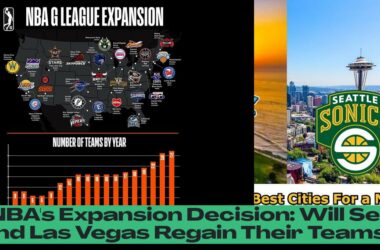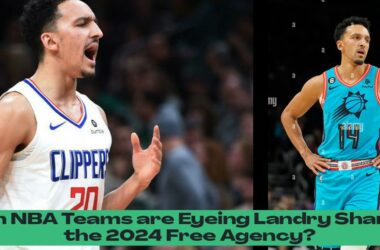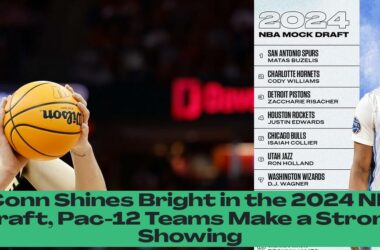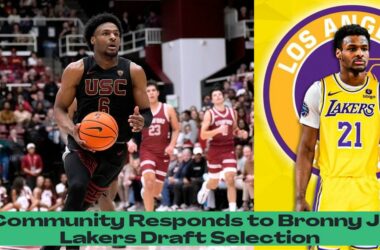NBA and TNT’s parent company gear up for a legal showdown in the sports rights battle of the century
Get ready for a basketball brawl of a different kind. The stage is set for a legal showdown that could reshape the landscape of American sports broadcasting. The NBA and TNT’s parent company, Warner Bros. Discovery, are locked in a bitter battle over media rights, with the fate of iconic shows like “Inside the NBA” hanging in the balance.
The NBA recently inked a groundbreaking 11-year, $76-billion media rights package, a deal that will redefine the league’s broadcast landscape for the next decade. This historic agreement, however, comes with a major twist: it marks the end of TNT’s long-standing relationship with the NBA, a partnership that has been a staple of basketball fandom for generations.
The league’s decision to sever ties with TNT has set the stage for a legal confrontation that promises to be as intense as any playoff series. Warner Bros. Discovery, the parent company of TNT, has publicly stated that it believes it has the contractual right to match any competing offers for the NBA’s media rights. This claim has further fueled the tension, setting the stage for a legal battle that could have far-reaching implications for the sports media industry.
The NBA’s new media rights deal includes partnerships with ESPN, NBC, and a major newcomer, Amazon Prime Video. Amazon’s entrance into the NBA’s media rights landscape is a significant development, as it signifies the growing influence of streaming services in the sports broadcasting world. The league’s decision to choose Amazon over TNT has raised eyebrows, leading many to speculate about the future of traditional cable networks in the face of the streaming revolution.
The NBA’s decision to reject TNT’s attempt to exercise its matching rights has sparked a fierce debate about the power dynamics within the sports media industry. Some argue that the league is right to prioritize its long-term financial interests, while others contend that the NBA is sacrificing a valuable partnership for the sake of a potentially risky deal with a streaming newcomer. The legal battle that is likely to follow promises to shed light on these complex issues, with the outcome potentially shaping the future of sports broadcasting for years to come.
TNT’s bid to match Amazon’s offer and the NBA’s rejection
The NBA’s decision to reject TNT’s attempt to match Amazon’s offer has been met with strong reactions from both sides. TNT Sports has publicly stated that they have matched the Amazon offer and believe they have a contractual right to broadcast NBA games. The network has asserted that they have a right to “match” any competing offers, a provision that was built into their original contract with the NBA. This provision, commonly known as a “matching right,” is designed to ensure that existing broadcast partners have the opportunity to retain valuable media rights.
The NBA, however, has rejected TNT’s claim, stating that Amazon’s offer is significantly more lucrative and provides a greater opportunity for the league to reach a broader audience. The NBA has argued that the new deal with Amazon is a strategic move that will allow the league to expand its reach into new markets and generate significant revenue growth. The league believes that the new deal with Amazon will create a more dynamic and engaging viewing experience for fans, aligning with the league’s vision for the future of sports broadcasting.
The NBA’s decision to prioritize its long-term strategic goals over its existing relationship with TNT has sparked controversy. Some argue that the league is prioritizing short-term financial gains over its long-standing partnership with TNT. Others, however, believe that the NBA’s decision is a necessary step in adapting to the rapidly evolving media landscape and ensuring the league’s continued success in the digital age. The NBA’s bold move to embrace Amazon as a partner, at the expense of its longtime relationship with TNT, is a testament to the league’s belief in the power of streaming and its commitment to reaching new audiences.
The legal battle between the NBA and TNT has raised fundamental questions about the power dynamics in the sports media industry. The NBA’s decision to embrace streaming and move away from traditional cable networks has triggered a wave of uncertainty about the future of sports broadcasting. The outcome of this legal battle could have far-reaching consequences, potentially reshaping the media landscape for years to come.
The impact of the NBA’s new media rights deal on TNT and its parent company, Warner Bros. Discovery
The NBA’s decision to end its partnership with TNT has sent shockwaves through the sports media landscape, and the consequences for TNT and its parent company, Warner Bros. Discovery, are significant.
Financially, the loss of NBA rights is a substantial blow to Warner Bros. Discovery. The NBA has been a cornerstone of TNT’s programming, attracting millions of viewers and generating substantial revenue for the network. The loss of these rights will significantly impact the network’s financial performance, potentially leading to significant revenue losses and a reduction in profits.
Beyond the financial impact, the loss of NBA rights also presents a major challenge to TNT’s brand identity. The NBA has been synonymous with TNT for decades, shaping the network’s reputation as a destination for premium sports programming. The loss of this association will likely impact the network’s brand image, potentially making it less appealing to viewers and advertisers.
The broader impact of the NBA’s decision on Warner Bros. Discovery’s overall strategy is also worth considering. The company has been actively pursuing a strategy of diversifying its portfolio and expanding its streaming offerings. The loss of NBA rights could potentially hinder the company’s efforts to compete in the increasingly competitive streaming market. The company will need to find new ways to attract viewers and generate revenue, potentially investing in new programming and expanding its streaming offerings.
The NBA’s decision to end its partnership with TNT has created a challenging situation for Warner Bros. Discovery. The company will need to navigate the financial and reputational implications of this move while simultaneously adapting to the evolving media landscape. The company’s ability to adjust and find new growth opportunities will be crucial in ensuring its continued success in the years to come.
The future of sports broadcasting: The rise of streaming and the decline of cable
The NBA’s decision to partner with Amazon over TNT highlights a major shift in the sports broadcasting landscape: the rise of streaming and the decline of traditional cable networks.
Streaming services like Amazon Prime Video, Netflix, and Hulu have become increasingly popular in recent years, offering viewers a more affordable and convenient way to access a wide variety of content. The rise of streaming has coincided with a decline in cable television subscriptions, as viewers ditch their cable packages in favor of streaming services. This trend has created opportunities for streaming services to enter the sports broadcasting market, offering a new platform for sports leagues to reach a growing audience.
The NBA’s decision to partner with Amazon is a significant sign of the times, demonstrating the league’s willingness to embrace the streaming revolution and reach a new generation of fans. This move is likely to be followed by other sports leagues, as they seek to maximize their reach and revenue in the digital age. The NBA’s decision to partner with Amazon is a clear signal that the future of sports broadcasting lies in the realm of streaming, and that traditional cable networks are facing an increasingly uncertain future.
The legal battle between the NBA and TNT is a microcosm of this broader shift in the media landscape. The NBA’s decision to prioritize a deal with a streaming service over its long-standing relationship with a cable network is a testament to the transformative power of streaming and its growing influence over the sports industry.
The future of sports broadcasting is likely to be defined by the increasing dominance of streaming services and the gradual decline of traditional cable networks. As sports leagues seek to maximize their reach and revenue, they will increasingly turn to streaming services as a platform to reach a global audience. The NBA’s decision to partner with Amazon is a sign of things to come, and the legal battle with TNT is a reminder of the challenges facing traditional cable networks in a rapidly evolving media landscape.
- The NBA and TNT’s parent company, Warner Bros. Discovery, are heading towards a legal clash over media rights.
- The NBA’s groundbreaking 11-year, $76-billion media rights deal marks the end of TNT’s long-standing partnership with the league.
- Warner Bros. Discovery believes it has the contractual right to match any competing offers for the NBA’s media rights, intensifying the battle.
- The NBA’s new media rights deal includes partnerships with ESPN, NBC, and Amazon Prime Video, signaling the rise of streaming services in sports broadcasting.
- The decision to choose Amazon over TNT has sparked debates about the future of traditional cable networks in the face of streaming platforms.
- The legal battle ahead will shed light on power dynamics in the sports media industry and could shape the future of sports broadcasting for years to come.









